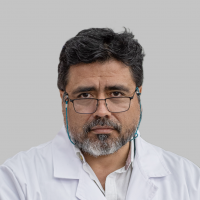You are here
Dr. Eduardo Pino López

Doctorate, 2004, University of Santiago de Chile, Chile. Chemist, 1999, University of Santiago de Chile, Chile.
Biomedicine, Kinetics, Photochemistry.
- RECIRCULA – circular economy in Ibero-American industry: waste in value-added products CYTED32RT01 Network 43- Ibero-American Program of Science and Technology for Development- CYTED, University of Santiago of Chile (2023-2026) researcher.
- Study of the generation of reactive oxygen species by means of titanium oxide nanotubes (TNTP) modified with nanoparticles and/or metallic nanorods for sustainable applications for modulated photocatalytic oxidation of model organic contaminants (dyes and/or drugs). Synergy between an experimental approach and theoretical chemistry tools. DICYT-USACH: 022241PL (2022-2024) Principal Researcher
- Study of the soluble chemical species present in spray water in an urban area of Santiago de Chile. 022341RC DICYT-USACH, University of Santiago of Chile. (2022-2024) Co- Researcher.
- Advanced Thermal Characterization Platform at the Faculty of Chemistry and Biology (Department of Environmental Sciences) with the implementation of the TGA-MS equipment, member of the Research Group, University of Santiago de Chile. FONDEQUIP EQM220007. (2022-2023). Researcher
- Super-adiabatic chemical combustor with porous material made from recycled materials. CORFO code 20CVID-128205 (2020-2021). Researcher.
- Development of an efficient filtration system for combustible gases with carbon oxides using PSA with MOFS as an adsorbent material CORFO code 18COTE-89704 (2019-2020) Researcher
- Electron transfer processes in peptides induced by free radicals: Influence of the amino acid sequence, peptide conformation and microenvironment Fondecyt ID: 1190881 (2018-2021). Co-Researcher.
8.- Ricardo Pino –Rios R., Pino E., Cárdenas-Jirón G. (2024). Deciphering the origin of the first steps in the degradation of azo dyes: a computational study (DOI: 10.1007/s11356-023-31172-6) Environmental Science and Pollution Research.
7.- Zambrano- Angulo M., Pino- Rios R., Pino E., Cárdenas- Jirón G. (2023). Theoretical study of Lithium oxide clusters adsorbed on anatase TiO2 surface. Surfaces and Interfaces (DOI: 10.1016/j.surfin.2023.102856) Surfaces and Interfaces
6.- Cament A., Moreno- Serna V., Loyo C., Quintana P., Seura P., Vallejos Baier R., Benavente R., Teresa Ulloa M, Rivas L. M., Pino E., Gómez T., Zapata P. A. (2022). Mechanical and antimicrobial properties of low-density- polyethylene/ MgO nanocomposites. (DOI: 10.1002/pat.5865) Polymerfor Advanced Technologies.
5.- Cifuentes G., Germain I., Garrido B., Cifuentes- Cabezas M., Orrego P., Gentico I., Pino E., Calderon C. (2022). Tetra-uranium fluoride electrowinning by electro- electrodialysis cell (EED) (DOI: 10.1016/j.seppur.2 021.119833). Separation and Purification Technology
4.- Adura C., Aliaga C., Silva F., Vera C., Pino, CelisF., Aracena A., Tirapegui C. 2021 A simple method to estimate the mean number of lipophilic molecules on nanoparticle surfaces(10.1088/1361-6528/abfc0c) Nanotechnology.
3.- Garrido B., Cifuentes G., Fredes P., Pino E., Calderón C., Cifuentes- Cabezas M. (2021). Copper Recovery from Ammonia Solutions Through Electro- Electrodialysis (EED), (DOI: 10.3389/fchem.20 20.622611). Frontier in Chemistry.
2.- Pino E., Calderón C., Castro P. (2021) (first publis ed 2020) TiO2-photocatalyzed degradation of the azo dye disperse red 1 in aqueous micellar environments (DOI: 10.1111/php.13298). Photochemistry and Photobiology.
1.- Pino E., Calderón C., Cifuentes G., Arteaga G. (2020). Photocatalytic degradation of aqueous Rhodamine 6G using supported TiO2 catalysts. A model for the removal of organic contaminants from aqueous samples (DOI: 10.3389/fchem.2020.00365). Frontiers in Chemistry- Catalysis and Photocatalysis.
